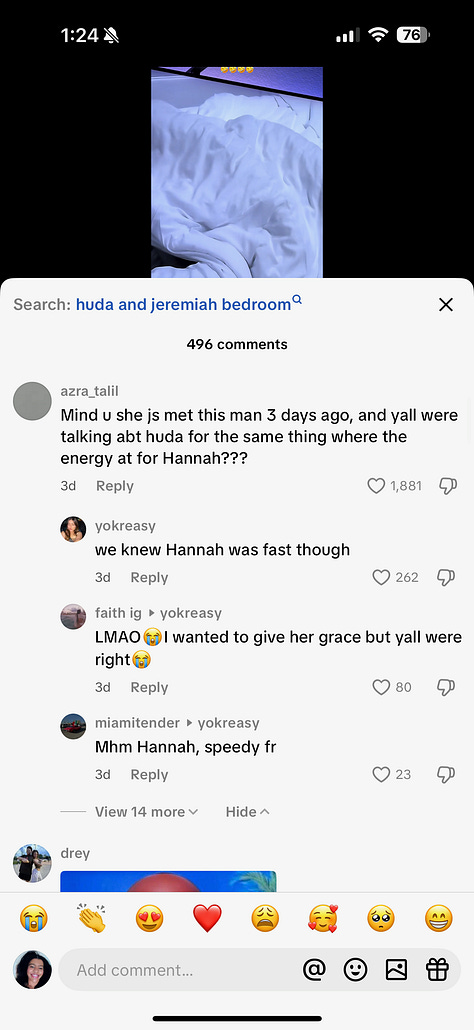Your Love Island Hot Takes Are Actually Conservative AF
It’s impossible to separate this commentary on women choosing to have sex from the systematic dismantling of health services that disproportionately affect women and marginalized communities.
I’ve noticed something peculiar as I’ve watched the latest season of Love Island USA. A woman on the show will have sex with the man she’s coupled up with, and the internet—well, mainly TikTok commentators—will morph into a tribunal on morality.
“She gave it up too soon.”
“He’ll never respect her now.”
“She didn’t make him work for it, so he has no reason to do anything extra for her.”
No matter how you frame it, the subtext is clear: If a man mistreats a woman after they’ve had sex, it’s her fault for not strategically withholding intimacy. Many commentators don’t seem to realize that this is misogyny, which is almost as concerning as the readiness to spew it into the ether to millions of people.








To me, these posts, and the thousands like them, convey a few things:
A fundamental lack of understanding that two consenting adults can have sex whenever they’d like, despite how long they’ve known one another. Do I think the concept of it being “too early” to have sex is inherently misogynistic? No. Context is critical in deciding when you’re ready to sleep with someone, and I believe the comfort, enthusiasm, and readiness of all parties involved are imperative when it comes to sex. However, the subtext of these comments is aligned with broader misogynistic thinking about when a woman “should” consent to sex.
The idea that it’s self-preservation for a woman to not sleep with a man she hasn’t known for an extended period, but is romantically interested in, because he’ll switch up on her, is misogyny.
Hannah and Pepe’s moment became a referendum on her character and career prospects, despite him being a willing partner in the sex.
Are men ever subjected to the same bullshit in these conversations??
God forbid a woman doesn’t put her sexual desires in a lock box.
It’s also impossible for me to separate this commentary from the systematic dismantling of health services that disproportionately affect women and marginalized communities.
Stay with me, I’m going to connect the dots.
During the Trump Administration’s first 100 days, we’ve witnessed an unprecedented assault on public health. Several unqualified people were placed in critical health positions within the government, including anti-vaccine zealot and brain worm carrier RFK Jr. as Secretary of the Department of Health and Human Services. Thousands of people employed at U.S. public health institutions were laid off, limiting the country’s capacity to research, prepare for, or respond to public health crises. Data and health guidance were removed from agency websites, including information about vaccines, LGBTQ+, reproductive health, and hate crimes, reducing easy access to health information designed for mass consumption. To boot, the budgets of health agencies have been cut by billions, and a proposed $800 billion cut to Medicaid is sitting in the Republican-controlled Senate, both of which will decimate health care access.
The pearl-clutching we’re seeing directed toward Love Island is a microcosm of America’s brash cultural shift toward conservatism, antisexualism1, and an overall sex negative2 attitude. Our society is moving backward on sexual autonomy writ large across policy and popular culture, both under the guise of concern for women’s emotional and physical well-being and, perhaps most insidiously, empowerment. The same cultural beliefs that allowed trad wifes, who repackage retrograde gender roles as empowering choices, and purity culture messaging from MAHA-brained wellness influencers to thrive are showing up as election results and within the Love Island zeitgeist and are now policing the show’s defining exhibitionism—which, according to fans who have watched all prior seasons, wasn’t really a thing before. The language defining this shift has evolved. No one is calling the women islanders “sults,” now they’re just worried they’re “devaluing themselves” or becoming examples of “why you shouldn’t sleep with a man too soon”—thinking that completely ignores that respect should be a given.
Mostly, I’m gobsmacked that more people don’t seem to realize that these beliefs are conservative or that they’re ruining the relatively benign experience of watching a raunchy television show.
Somebody had to say it, and it might as well be me.
Part of Love Island’s premise is hot people hooking up with other hot people. (The other is seeing real people get real vulnerable in their search for love. This season is giving Big Brother in a nasty way, but that’s a different post for a different publication.) It’s not a cautionary tale about sexual propriety; it’s meant to be messy, dramatic, and overtly sexual. It’s also weird to partake in a zeitgeist that doesn’t align with your interests since participation is literally optional. For instance, I’ve never seen a Harry Potter film or read one of the books, and I don’t know what Slytherin or Whiteclaw or whatever means, nor do I understand why people care so much about it. So when my friends discuss Harry Potter, I disengage and let them have it. Not being included in the conversation hasn’t affected my life negatively at all.
Anyway, if we want to ensure a healthy future, we’ll need to recognize that women’s sexual agency isn’t up for public debate or strategic calculation. I hope people reading this who came in conservative-leaning on the subject understand that if someone loses respect for you based on when you have sex, they were never going to respect you anyway. I want to live in a society where people can choose to enjoy trashy reality TV without turning it into a morality play about a woman’s worth. Most importantly, I implore people to pause and connect the dots between the comment sections and policymakers. The same impulse that drives people to police women’s sexuality on TikTok is driving the systematic dismantling of reproductive healthcare.
Until we recognize that these aren’t separate issues, we’ll continue to watch our rights disappear while arguing about whether someone gave it up too soon on a dating show.
A firm or hostile opposition to sex.
Viewpoints that maintain that sex is problematic or harsh judgments about sex.




